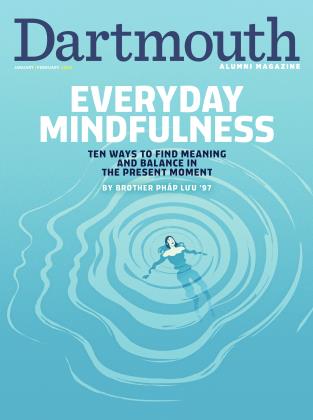2022
One of my core memories senior year was sitting next to Ethan Moon in the first floor of Berry, bothering him with Stata questions and watching him work on his economics thesis. Naturally, when he finished his master’s program with Fulbright, I was thrilled to learn about his year in the United Kingdom.
Similar to some other ’22s I’ve interviewed for the column, Ethan wanted to go abroad for his master’s program because his study-abroad term was cancelled due to Covid. His senior thesis examined the relationship between corporate board composition and firm performance, and Fulbright provided both the opportunity to study abroad and the flexibility to pursue research as an extension to his work at Dartmouth. For his dissertation, he used the same data as his undergraduate thesis but asked a different question: How does corporate governance affect sustainability? Ethan admits that his research at Dartmouth was vital to win the scholarship and produce the results for his dissertation. Because Dartmouth did a good job in promoting climate change, he realized that his project and data were very interesting from a sustainability perspective during senior year, but it was too late for him to change topics. He then worked with Professor Levin to fine-tune his Fulbright scholarship application so he could continue to examine the data with a different question at Lancaster University.
The master’s program at Lancaster consisted of four quarters: fall and winter were mostly coursework, and the last two terms focused on formulating the dissertation. Although the structure was similar to Dartmouth, the approach to education and research was very different from what Ethan experienced as an undergraduate student. “The United Kingdom was surprisingly different for how similar it was expected to be compared to the United States,” he said. He described the focus on research as qualitative and philosophical, while most research classes in the economics department at Dartmouth would require data to back any theory. As an example, a Dartmouth economics class would talk about climate change through health outcome, lifespan change, and economic productivity, but his program at Lancaster would encourage students to discuss the relationship between sustainability and ecofeminism movements. Ethan embraced the differences as a part of his philosophy of “trying to experience as much as possible,” and his qualitative dissertation was published in the Harvard Business Review the day I interviewed him for this column.
Besides his academic success, he enjoyed making new friends in London and keeping in touch with old ones. Joking that he “loves these people too much,” Ethan kept in touch with many Dartmouth friends through almost weekly calls. He’s also wrapping up a collaborative paper that he started with Claire McMahon and Yangyang Li, and the paper will be published with their Dartmouth professors via the National Bureau of Economic Research.
Ethan is now back home in Atlanta and starting his job as a consultant at Bain. He admits that he will strongly consider moving to Boston, where he can be more connected to the Fulbright community, research institutions, and Dartmouth classmates. Before his move down the road, we can at least read his work in the Hai-vard Business Review or catch him on a Bain recruiting visit back on campus.
—Louisa Gao, 279E44thSt, Apt3L, New York, NY 10017; Iouisa.gao0922@g7nail.co7n
 View Full Issue
View Full Issue
More From This Issue
-
 Features
FeaturesEveryday Zen
JANUARY | FEBRUARY 2024 By JIM COLLINS ’84 -
 Features
FeaturesWhale Watch
JANUARY | FEBRUARY 2024 By Svati Kirsten Narula ’13 -
 FEATURES
FEATURESThe Buckaroo Effect
JANUARY | FEBRUARY 2024 By TY BURR '80 -
 FEATURES
FEATURESA Monk’s Journey
JANUARY | FEBRUARY 2024 By JIM COLLINS '84 -
 notebook
notebookAvalanche
JANUARY | FEBRUARY 2024 By CHARLIE PIKE '22 -
 notebook
notebookPrimary Season
JANUARY | FEBRUARY 2024 By NANCY SCHOEFFLER
Louisa Gao
-
 CLASS NOTES
CLASS NOTES2022
NOVEMBER | DECEMBER 2022 By Louisa Gao -
 CLASS NOTES
CLASS NOTES2022
JANUARY | FEBRUARY 2023 By Louisa Gao -
 CLASS NOTES
CLASS NOTES2022
NOVEMBER | DECEMBER 2023 By Louisa Gao -
 CLASS NOTES
CLASS NOTES2022
MAY | JUNE 2024 By Louisa Gao -
 CLASS NOTES
CLASS NOTES2022
JULY | AUGUST 2024 By Louisa Gao -
 CLASS NOTES
CLASS NOTES2022
JULY | AUGUST 2025 By Louisa Gao
Class Notes
-
 Class Notes
Class Notes1884*
April 1942 By Benjamin P. George -
 Class Notes
Class Notes1902
January 1946 By DR. PHILIP P. THOMPSON, JUDGE DAVIS B. KENISTON JR. -
 Class Notes
Class NotesCLASS OF 1891
June, 1909 By Frank E. Rowe -
 Class Notes
Class Notes1904
JANUARY 1965 By HARRY B. JOHNSON, THOMAS W. STREETER, "L.W." -
 Class Notes
Class Notes1958
SEPTEMBER 1998 By Pete Kelsey -
 Class Notes
Class Notes1945
March 1961 By SAMUEL E. CUTLER JR., ROBERT D. OLDFIELD JR.

